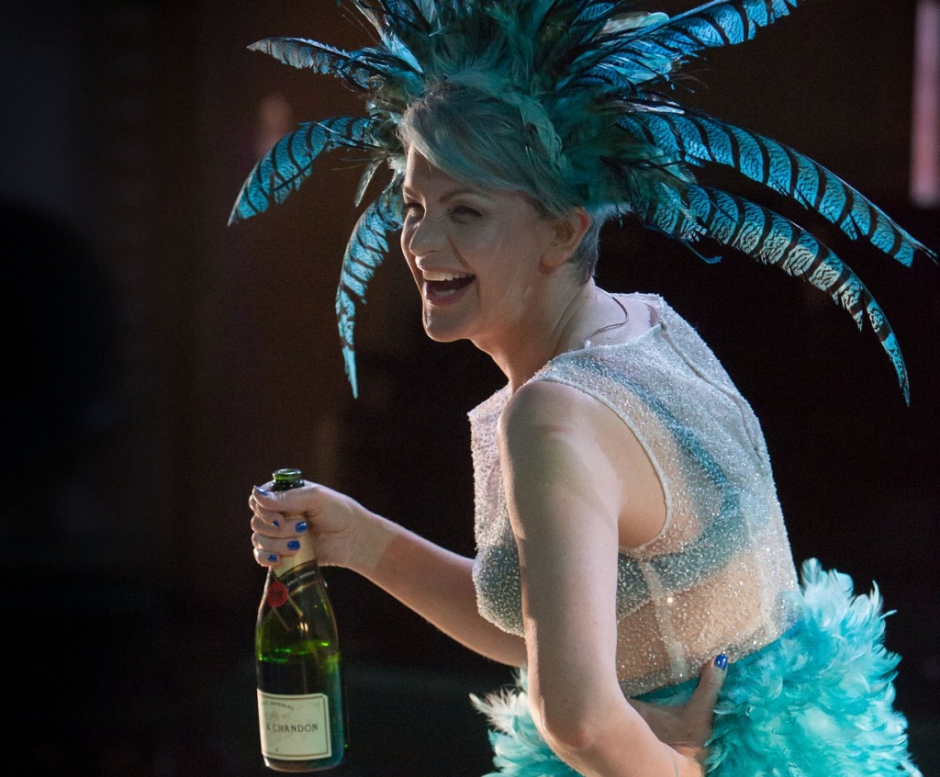Twelfth Night, directed by Jo Davies; The Royal Exchange Theatre, April 20.
Shakespeare’s Twelfth Night depicts the events that take place after a shipwreck separates twins Viola (Faith Omole) and Sebastian (Daniel Francis-Swaby), leaving them to fend for themselves in Illyria with no knowledge of the whereabouts or wellbeing of the other. Viola seeks refuge and employment with Orsino (Kevin Harvey), though she must disguise herself as a man to work for him. Under the name of Cesario, Viola is tasked with relaying messages of love and offers of marriage from Orsino to Olivia (Kate Kennedy). In a farcical twist, Olivia, believing Viola/Cesario to be a man, falls in love with her while Viola falls in love with Orsino. This love triangle is complicated further when Sebastian arrives in Illyria and is mistaken for Viola/Cesario and a series of misrecognitions and misunderstandings ensue, confusing the concepts of identity and intention, as love, anger, and the law all find themselves misattributed.
While this is happening, Olivia’s uncle Sir Toby Belch (Simon Armstrong), her servant Maria (Mina Anwar), and a friend of Toby’s Sir Andrew Aguecheek (Harry Attwell) conspire to make Malvolio (Anthony Calf) believe that Olivia has fallen in love with him with the help of a local fool, Feste (Kate O’Donnell). Collectively, these characters pull increasingly elaborate pranks on Malvolio until he is mistakenly labelled mad and imprisoned. In this production, Jo Davies elects to place more emphasis on this subplot than what is traditionally allotted, with the most elaborate set pieces and scene production being dedicated to the events involving Malvolio’s deception.
It is cliché by now to say that Twelfth Night explores gender identity and the fluidity of gender presentation, yet Davies’ production manages to portray these themes in a refreshing and engaging manner, largely thanks to Kate O’Donnell involvement and casting as artistic director of Trans Creative. Previous productions of Twelfth Night have often felt as though the gender identity was an issue that needed to be resolved. Davies’ production seems like more of a celebration of non-normative gender identities and expression: the performances of the whole cast seem to be heavily influenced by drag, cabaret, and disco, with the most explicit and successful example being O’Donnell herself, from her costumes and her audience interaction, to her performance of the musical numbers.
Music is at the centre of this production, and each key scene is delivered or bookended by a performance from a handful of musicians who share the stage with the actors. Expertly orchestrated by Tarek Merchant, the music signals that this is a thoroughly modernised production of Shakespeare, attempting to reread Shakespeare’s play in light of our current historical moment. It is a difficult (and perhaps, pointless) task to project oneself into the Elizabethan period when watching a drunk man being pushed around in shopping trolley to a disco soundtrack, topped by a wailing electric guitar solo while people dressed in feathers dance around him. It is much more enjoyable to allow oneself to identify with the chaos and view these characters as belonging as much in the twenty-first century as the seventeenth.
Visually, this production lends itself to queerness and fluidity. The stage is propped with chairs and tables that are cocked and slanted. Every object is in some way distorted by the events that are transpiring around it. The most inventive and effective of these was a pile of sand that initially figured the beach Viola washed up on, but throughout the course of the play became scattered haphazardly by the actors moving over it, intermittently reshaped into new forms and new purposes, taking on a path or another island on the stage. This was an especially creative touch by designer Leslie Travers, reflecting the central dynamics of the production.
This particular production of Twelfth Night is refreshing and insightful. It pays a welcome homage to queer performance art forms and is at once camp and ostentatious while managing a subtlety and detail that lends the production a substance and nuance. Davies’ production is bashful, musical, and terrifically fun.

